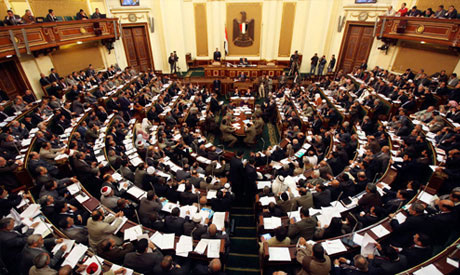
File photo: Egyptian parliament (Photo: Reuters)
Following a three-week Christmas holiday, Egypt's parliament will reconvene Sunday to grapple with a host of issues.
According to the schedule of debate on Sunday, parliament will meet to discuss the new government-drafted amendments to Egypt's Central Depository and Registration Law (93/2000).
A report jointly prepared by parliament's economic and legislative and constitutional affairs committees said the 60-article Central Depository and Registration Law forms the basis of the performance of the stock market and that it is critical for creating a more investment-friendly climate in Egypt.
"This law, passed in 2000, is a turning point in the history of the Egyptian stock market. It led to transforming trade operations on the stock market from manual to electronic," said the report.
The amendments, the report said, aim to achieve a number of objectives.
"First, they are meant to be in line with the 2015 amendment of the Joint Stock Companies Law (17/2015) which made trading of the shares of these companies (numbering 130,000) governed by the central depository and registration system," said the report, adding that "second, they aim to be in harmony with the 2018 amendments of the Capital Market Law which led to the creation of the future contracts bourse that will also be regulated by the central depository and registration system."
Third, said the report, the amendments open the door for new companies to join the business of central depository and registration works.
"Right now, one company, the public sector Misr Maqassa (Clearance), is monopolising the business in this sector. With the new law, this will no longer be the case. Private companies will be allowed to join," said the report.
The government's financial securities (treasury bills and bonds) which are issued by the Central Bank of Egypt (CBE) on behalf of the Ministry of Finance, will be monopolised by a company fully owned by the CBE and licensed by the Financial Control Authority.
The government’s explanatory note on the law said the amendments regulate the activities of clearance and settlement of financial securities "and this is necessary for settling the legalities of trading in financial securities and the rights and obligations of those who do business in this sector."
When the amendments came up for debate for the first time in a meeting held by the economic committee on 20 October, Abdel-Hamid Ibrahim, an advisor to the chairman of the Financial Control Authority, explained that "the goal of the amendments is to help attract more investments to the stock securities market in a manner that could positively impact the international credit rating of Egypt.
“The new amendments do not affect in any way the existing entity which is in charge of the clearance and settlement system, since it is internationally recognised,” Ibrahim noted.
The meeting saw much debate on Article 35 that allows the CBE to monopolise business in treasury bonds and bills via a joint-venture company to be formed for his purpose.
Article 35 also states that the Financial Control Authority is the entity officially authorised to license joint-venture companies to do the business of the clearance and settlement of contracts concluded on the stock market.
The article lists all the requirements that must be first met for joint-venture companies to obtain an official licence.
Ashraf El-Araby, deputy chairman of parliament’s economic committee, said since the amendments are closely related to the investment and capital market, the committee was keen to hold intensive discussions on all its articles, individually, to ensure it will positively affect the economic and business climate of Egypt.
Short link: